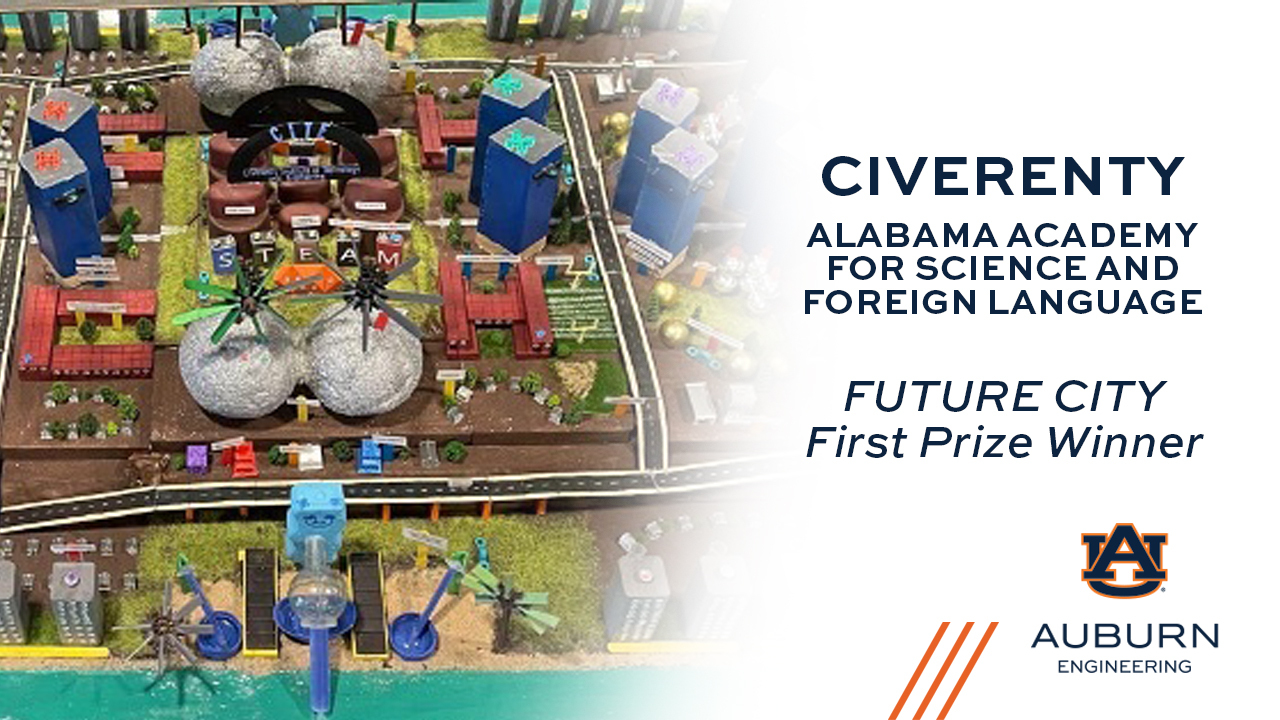Future City competition yields electric results from middle schoolers
Published: Jan 24, 2024 2:05 PM
By Cassie Montgomery
Can middle schoolers use science, technology, engineering and mathematics (STEM) principles to make the world a better place? Through Future City, a hands-on cross-curricular educational program that brings STEM to life for students in grades six through eight, they’re encouraged to try.
The Samuel Ginn College of Engineering’s Office of Recruitment, Outreach and Scholarship recently hosted 19 middle school student teams from throughout the state in the Alabama regional competition. This year’s theme, “Electrify Your Future,” challenged teams to design a completely electrically powered city with energy generated from sources that keep citizens and the environment healthy and safe.
A team from the Academy for Science and Foreign Language in Huntsville was awarded first prize trophies, a check for $300 and a trip to the Future City Competition international finals in Washington, D.C. in February, for their future city, “Civerenity.” Austin Middle School of Decatur and Central School of Huntsville were awarded second and third place, respectively. An additional 14 special awards sponsored by engineering professional societies, which included prizes of commemorative plaques and checks for $150, were awarded in categories such as “Best Use of Quality Concepts” and “Best Integrated Systems Solution.”
“Auburn Engineering is committed to exposing students to the field of engineering,” said Sydney Riley, administrator of outreach for Auburn Engineering and a Future City regional coordinator for Alabama. “We need more engineers in the world, and programs like Future City give students a glimpse into what being an engineer really is. Auburn Engineering values hard work and teamwork, and we want to promote and encourage students to tackle challenges, even in middle school.”
The Future City competition is a project-based learning experience where students imagine, research, design and build cities 100 years in the future in a team setting with an educator and STEM mentor. They research today’s public spaces and write an essay about their solutions and city design. Students then bring their ideas to life by building a tabletop scale model of their city using recycled materials on a budget of $100 or less and give a brief presentation about their city.
“Our job in Auburn Engineering K-12 Outreach is to engage and inspire the future generation of Auburn engineers. By supporting this program, we are teaching students necessary skills they will need as Auburn engineers,” said Brooke Chandler, academic programs administrator. “This program gives a unique approach since we not only ask them to think critically when building their city using technical skills, but they also need to communicate why their city is the best to a room of judges – a soft skill. I believe providing both a technical and soft skill competition will truly make the best future engineers.”
Media Contact: , cmontgomery@auburn.edu, 334.844.3668
A team from the Alabama Academy for Science and Foreign Language took home the Future City regional top prize.

